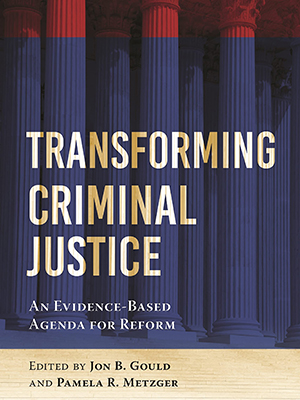
Dean Jon Gould’s latest volume offers blueprint
Transforming Criminal Justice: An Evidence-Based Agenda for Reform, a new collection of essays edited by Dean Jon Gould and Pamela Metzger, professor of law at Southern Methodist University, addresses 13 significant issues in justice reform.
 The issues range from a suspect’s first interaction with the police and continuing to gun violence, prosecutorial innovation, sentencing reform, eliminating bail, recidivism and reentry, collateral consequences of crime, and eliminating false convictions.
The issues range from a suspect’s first interaction with the police and continuing to gun violence, prosecutorial innovation, sentencing reform, eliminating bail, recidivism and reentry, collateral consequences of crime, and eliminating false convictions.
The essays are written by some of today’s leading criminal justice scholars and practitioners. A common theme: the American criminal justice system is riddled with weaknesses that cause harm and require greater accountability. Each chapter helps readers understand the problems that plague the criminal justice system, how those problems can be addressed, and who should take responsibility for them.
In their introduction, Gould and Metzger write:
This book provides a road map for those who want to change the face of American criminal justice. It addresses pressing problems facing the criminal justice system and offers a blueprint of initiatives for reform. Using lessons gleaned from empirical research, the book provides policymakers, practitioners and academics, and interested lay people a plan for how and why to reform the criminal justice system…
Criminal justice is a profession, a designation that carries with it higher responsibilities. Professionals should not make decisions about people’s liberty, the community’s safety, or the use of tax dollars by relying on anecdotal understandings or outdated assumptions. Evidence-based practice offers a better path to accomplish what is undoubtedly a shared goal: the prevention of harm.
Jeremy Travis, former president of John Jay College of Criminal Justice and author of But They All Come Back: Facing the Challenges of Prisoner Reentry reviewed Transforming Criminal Justice: “The ideas found in this ambitious and timely volume are particularly welcome. The book is chock-full of creative new approaches, from participatory defense as a movement-building strategy to temporary guaranteed income to support successful reentry. These ideas presented here are animated by a refreshing insistence on policies that reflect solid evidence, not political posturing. Taken together, they provide a platform for advocates committed to the hard work of unwinding our country’s harmful and ineffective criminal justice apparatus.”